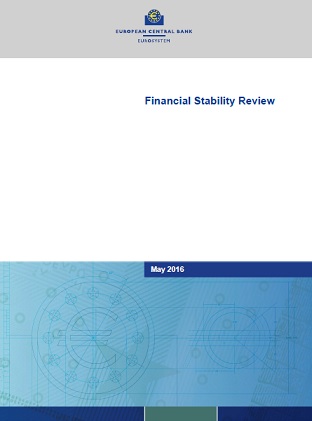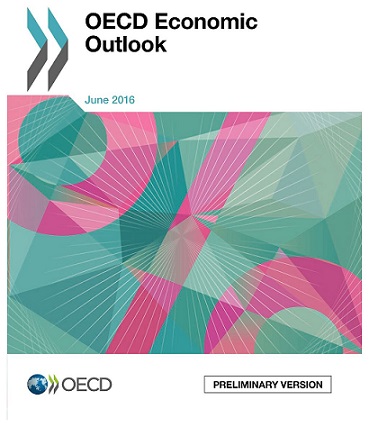Bibow, Jörg, (2016), “From Antigrowth Bias to Quantitative Easing”, Levy Economics Institute, June This paper investigates the European Central Bank’s (ECB) monetary policies. It identifies an antigrowth bias in the bank’s monetary policy approach: the ECB is quick to hike, but slow to ease. Similarly, while other players and institutional deficiencies share responsibility for the euro’s failure, the bank has generally done “too little, too late” with regard to managing the …Read More
Financial Stability Review
European Central Bank, (2016), “Financial Stability Review”, ECB, May The Financial Stability Review (FSR) assesses developments relevant for financial stability, including identifying and prioritising the main sources of systemic risk and vulnerabilities for the euro area financial system – comprising intermediaries, markets and market infrastructures. It does so to promote awareness of these systemic risks among policymakers, the financial industry and the public at large, with the ultimate goal of …Read More
Survey on the Access to Finance of Enterprises in the euro area
European Central Bank, (2016), “Survey on the Access to Finance of Enterprises in the euro area”, ECB, June This report presents the main results of the 14th round of the Survey on the Access to Finance of Enterprises (SAFE), which was conducted between 10 March and 21 April 2016. The total euro area sample size was 11,725 enterprises, of which 10,709 (91%) had fewer than 250 employees.1 The report mainly …Read More
OECD Economic Outlook
OECD, (2016), “OECD Economic Outlook”, OECD, Volume 2016 Issue 1, June The global economy is stuck in a low-growth trap that will require more coordinated and comprehensive use of fiscal, monetary and structural policies to move to a higher growth path and ensure that promises are kept to both young and old, according to the OECD’s latest Global Economic Outlook. “Growth is flat in the advanced economies and has slowed in many …Read More
Neoliberalism: Oversold?
Ostry, Jonathan D., Loungani, Prakash, Furceri, Davide, (2016), “Neoliberalism: Oversold?”, IMF Finance and Development, Volume 53 Number 2, June Milton Friedman in 1982 hailed Chile as an “economic miracle.” Nearly a decade earlier, Chile had turned to policies that have since been widely emulated across the globe. Th e neoliberal agenda—a label used more by critics than by the architects of the policies— rests on two main planks. Th e fi rst …Read More
Europe 2020 indicators – poverty and social exclusion
Eurostat/Europe 2020 indicators – poverty and social exclusion/March 2016 This article is part of a set of statistical articles on the Europe 2020 strategy. It provides recent statistics on poverty and social inclusion in the European Union (EU). The Europe 2020 strategy is the EU’s agenda for growth and jobs for the current decade. It emphasises smart, sustainable and inclusive growth as a way to overcome the structural weakness in Europe’s economy, to improve its competitiveness …Read More
Lessons for the euro from early US monetary and financial history
Frieden, Jeffry, (2016), “Lessons for the euro from early US monetary and financial history”, Bruegel Essay, 25 May Europe’s central goal for several decades has been to create an economic union that can provide monetary and financial stability. This goal is often compared to the long-standing monetary union that is the United States. Easy celebration of the successful American union ignores the fact that it took an extremely long time to …Read More
The Business Models and Economics of Peer-to-Peer Lending
Alistair Milne, Paul Parboteeah, (2016), “The Business Models and Economics of Peer-to-Peer Lending”, ECRI Researcb Report No. 17, May This paper reviews peer-to-peer (P2P) lending, its development in the UK and other countries, and assesses the business and economic policy issues surrounding this new form of intermediation. P2P platform technology allows direct matching of borrowers’ and lenders’ diversification over a large number of borrowers without the loans having to be …Read More
The Euro Plus Monitor Spring 2016 Update
Holger Schmieding, (2016), “The Euro Plus Monitor Spring 2016 Update”, The Lisbon Council, 22 Μαϊου Europe can adjust. It has done so before. In the 1980s, Margaret Tatcher cured the “sick man of Europe.” In the 1990s, Scandinavian countries reformed their bloated welfare states. From 2004 to 2006, Germany turned its struggling economy into a new growth engine for Europe through serious labour market and welfare reforms. And, in many …Read More
Recent trends in euro area banks’ business models and implications for banking sector stability
Christoffer Kok, Csaba Móré, Monica Petrescu, (2016), “Recent trends in euro area banks’ business models and implications for banking sector stability”, ECB Financial Stability Review, May This special feature reviews recent trends in business model characteristics, discusses their relationship with bank stability and performance, and looks at how this relationship has changed over time, comparing the period before the crisis with the crisis years and the current situation.The financial crisis and …Read More







